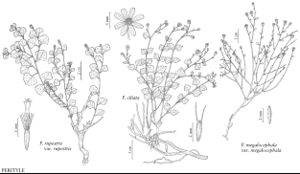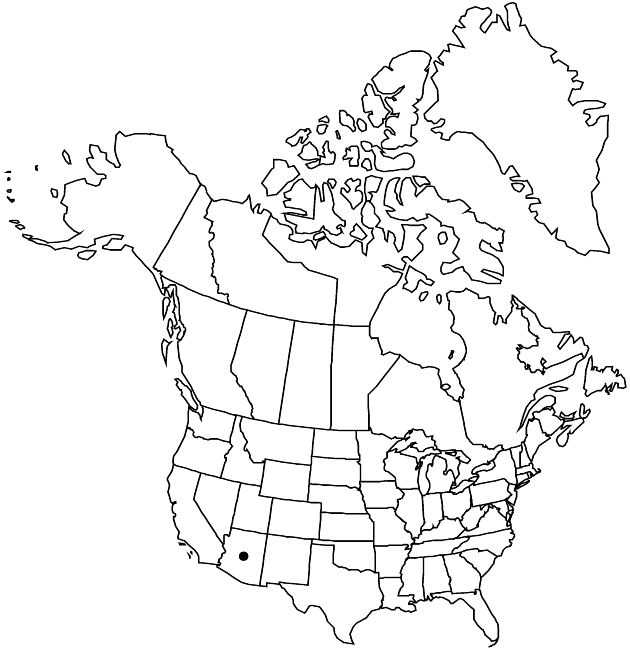Difference between revisions of "Perityle ciliata"
in N. L. Britton et al., N. Amer. Fl. 34: 17. 1914.
FNA>Volume Importer |
imported>Volume Importer |
||
| (3 intermediate revisions by 2 users not shown) | |||
| Line 1: | Line 1: | ||
{{Treatment/ID | {{Treatment/ID | ||
|accepted_name=Perityle ciliata | |accepted_name=Perityle ciliata | ||
| − | |accepted_authority=(L. H. Dewey) Rydberg | + | |accepted_authority=(L. H. Dewey) Rydberg |
|publications={{Treatment/Publication | |publications={{Treatment/Publication | ||
|title=in N. L. Britton et al., N. Amer. Fl. | |title=in N. L. Britton et al., N. Amer. Fl. | ||
| Line 8: | Line 8: | ||
}} | }} | ||
|common_names=Fringed rock daisy | |common_names=Fringed rock daisy | ||
| + | |special_status={{Treatment/ID/Special_status | ||
| + | |code=F | ||
| + | |label=Illustrated | ||
| + | }}{{Treatment/ID/Special_status | ||
| + | |code=E | ||
| + | |label=Endemic | ||
| + | }} | ||
|basionyms={{Treatment/ID/Basionym | |basionyms={{Treatment/ID/Basionym | ||
|name=Laphamia ciliata | |name=Laphamia ciliata | ||
|authority=L. H. Dewey | |authority=L. H. Dewey | ||
| + | |rank=species | ||
|publication_title=Bot. Gaz. | |publication_title=Bot. Gaz. | ||
|publication_place=20: 425. 1895 | |publication_place=20: 425. 1895 | ||
| Line 38: | Line 46: | ||
-->{{#Taxon: | -->{{#Taxon: | ||
name=Perityle ciliata | name=Perityle ciliata | ||
| − | + | |authority=(L. H. Dewey) Rydberg | |
| − | |authority=(L. H. Dewey) Rydberg | ||
|rank=species | |rank=species | ||
|parent rank=section | |parent rank=section | ||
| Line 52: | Line 59: | ||
|publication title=in N. L. Britton et al., N. Amer. Fl. | |publication title=in N. L. Britton et al., N. Amer. Fl. | ||
|publication year=1914 | |publication year=1914 | ||
| − | |special status= | + | |special status=Illustrated;Endemic |
| − | |source xml=https:// | + | |source xml=https://bitbucket.org/aafc-mbb/fna-data-curation/src/2e0870ddd59836b60bcf96646a41e87ea5a5943a/coarse_grained_fna_xml/V19-20-21/V21_798.xml |
|tribe=Asteraceae tribe Heliantheae | |tribe=Asteraceae tribe Heliantheae | ||
|subtribe=Asteraceae (tribe Heliantheae) subtribe Peritylinae | |subtribe=Asteraceae (tribe Heliantheae) subtribe Peritylinae | ||
Latest revision as of 20:14, 5 November 2020
Subshrubs, 15–30 cm (in rock crevices, stems relatively many, erect to pendulous); sparsely to densely short-hairy, glandular. Leaves: petioles 2–15 mm; blades deltate-ovate to ovate-rhombic, 6–23 × 5–24 mm, margins usually entire or serrate to serrate-crenate, sometimes shallow-lobed. Heads in corymbiform arrays, 5–7 × 5.5–7 mm. Peduncles 5–25 mm. Involucres campanulate. Phyllaries 13–20, linear-lanceolate to narrow-ovate, 4–5.5 × 1–2 mm. Ray florets 6–10; corollas white, sometimes pink tinged, laminae broadly oblong to oblong-elliptic, 3–7 × 1.5–3 mm. Disc florets 30–40; corollas yellow, often purple tinged, tubes 0.8–1 mm, throats tubular to tubular-funnelform, 1.2–1.4 mm, lobes 0.3–0.4 mm. Cypselae linear-oblong to oblanceolate, 2–2.8 mm, margins prominently calloused, long-ciliate; pappi of 2(–3+) barbellulate bristles 1.5–2.5 mm plus crowns of hyaline, laciniate scales. 2n = 34.
Phenology: Flowering spring–fall.
Habitat: In rock crevices
Elevation: 1100–2500 m
Discussion
Perityle ciliata is found only in the mountains of central Arizona in Apache, Coconino, Gila, Mohave, and Yavapai counties. It appears to be most closely related to P. coronopifolia.
Selected References
None.

